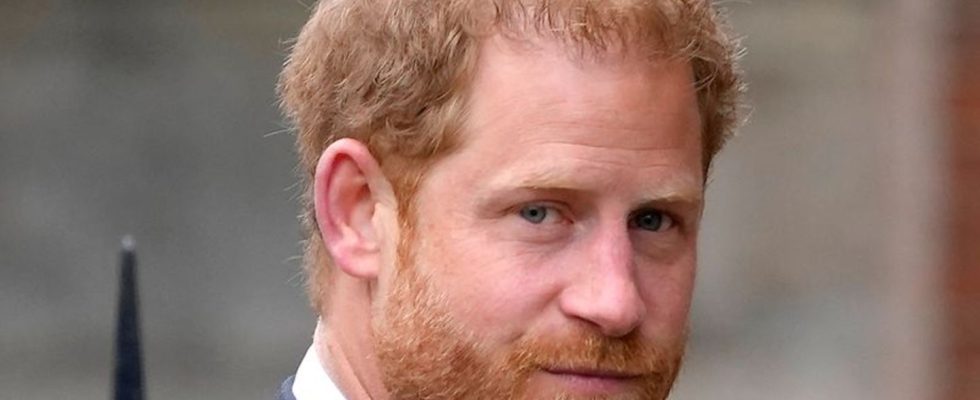Noble
Historical: Prince Harry in the London trial on the witness stand
Prince Harry arrives at the Royal Courts of Justice. photo
© Kirsty Wigglesworth/AP
Love, parties, drugs – whatever Prince Harry was (supposedly) doing, it was soon in the papers. Often, however, the papers are said to have obtained the information illegally.
Great Britain is gearing up for a historic court day: Prince Harry is the first member of the Royal Family to take the witness stand in more than 130 years. King Charles III’s son is to testify personally in the London trial against the publisher Mirror Group Newspapers (MGN). The 38-year-old accuses the MGN newspapers “Daily Mirror”, “Sunday Mirror” and “People” of having illegally wiretapped and spied on him for years – even as a minor.
The High Court in the British capital is examining a total of 33 articles. The first is from September 16, 1996. “Diana so sad on Harry’s big day,” wrote the “Mirror” headed a report that mother Princess Diana is said to have spent little time with her son on his twelfth birthday. Another article is about Harry’s minor operation after a sports accident at his school – medical details included. Again and again in focus: the love life of the prince. “People” reported in April 2009 that Harry “bombarded” his longtime girlfriend Chelsy Davy with messages to win her back.
Revelations fueled by “unlawful activity.”
“No aspect of the young prince’s life was safe,” said Harry’s attorney, David Sherborne. School, friends and family were targets of the press in pursuit of private details and scandals. As a result, distrust was sown between Harry and his older brother Prince William, and the relationship with Chelsy Davy had broken up in public. “The ups and downs and ins and outs of their relationship, the beginning, the breakups and finally the breakup, were revealed and dissected across the three sheets of The Mirror Group,” Sherborne said.
The revelations were apparently driven by “illegal activities”. “These methods acted like a spider’s web around the prince in hopes of intercepting valuable information that they were seeking through illegal means, some of which became stories,” Sherborne said. With Harry’s friend Guy Pelly, one of the closest confidants of the royal was also targeted by the MGN newspapers.
In the case of civil class action lawsuits, the cases of several celebrities are dealt with as an example. The focus is on how involved the management level of the publishing house was in the practices. MGN lawyer Andrew Green dismissed the allegations as “fairytale” and “complete speculation”. The trial began on May 10 and is expected to be completed by the end of June. The verdict is not expected until later in the year. If Harry and the other celebrities are right, the court should award them damages.
It was actually expected that Harry would take part in the process on Monday. Surprisingly, the 38-year-old did not appear – to the evident annoyance of the judge. He criticized that witnesses had to be available a day before they testified.
Harry cross-examined
Harry must now cross-examine the questions of the other side’s lawyer. The court granted MGN representative Andrew Green half a day more for questioning. The interrogation could be a painful experience for Harry, media lawyer Matthew Dando told the BBC. The stakes are unbelievable and the presentation of evidence creates additional uncertainty. The aim is to undermine the credibility of the witness. “There is hardly anything that is taboo. It could invade all areas of personal and private life,” said Dando.
For Harry, the statement and the lawsuits against a total of three publishers of tabloid media – a process is still pending in the other two cases – are part of his declared life goal of reforming the press landscape. He has long accused the tabloid press of being responsible for the accidental death of his mother Princess Diana in 1997 and of having destroyed his own life.
Part of the monarchy’s public image is not to let processes matter. The last royal to be cross-examined in 1891 was the later King Edward VII, he was heard as a witness in a case of card fraud.
The process could increase Harry’s popularity, especially among young people who are increasingly critical of the institution, Royals expert Pauline Maclaran from London’s Royal Holloway University told the BBC. In this case, he is considered an outsider. “A lot of young people see him as a heroic figure fighting against the establishment,” she said.

